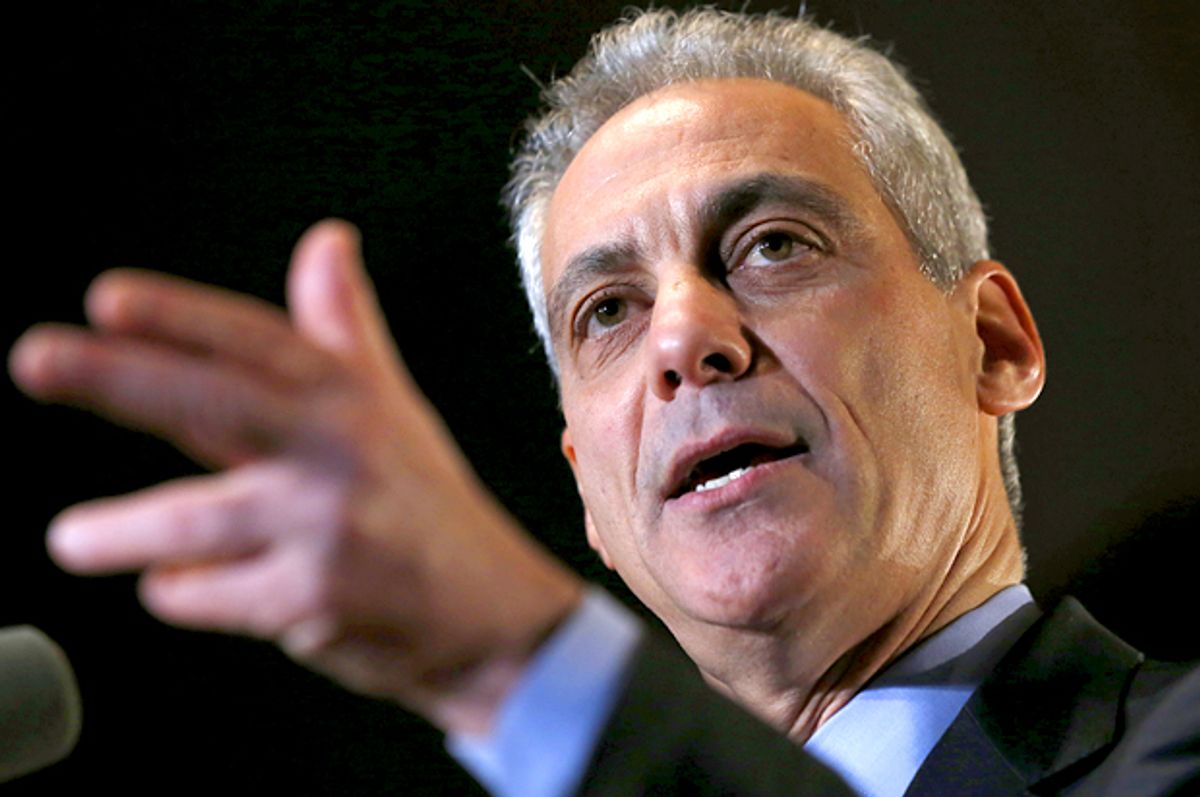Reading the Washington Post's editorials is often, I find, an edifying experience. The paper's positions so often provide a revealing glimpse of the centrist Village's zeitgeist: Support for marriage equality, abortion rights, and action to arrest climate change are marks of politeness and decency; meanwhile, gutting public employee pensions, massive cuts to the social safety net, and an affinity for military force are taken to be signs of realism and seriousness. Given this mix of policy preferences, it's only natural that the paper hopes to see Chicago voters re-elect their neoliberal mayor, Rahm Emanuel, who faces a formidable progressive challenge from Cook County commissioner Jesus "Chuy" Garcia in next month's runoff election.
In an editorial that reads as if it were prepared by one of the brighter sophomores on the Emanuel campaign's intern team, the Post writes today that Emanuel finds himself in a fight for political survival because "Democratic Party purists and special interest groups" have irrationally concluded that the "liberal" mayor "is not liberal enough," showing too much of an eagerness to take on "the special interests" beloved by his left-wing opponents.
Consider Emanuel's public pension cuts, which the Post cites as evidence of how sober and serious Chicago's embattled mayor is. Parroting the arguments put forth by neoliberal Democrats and conservative Republicans, the paper asserts that Emanuel's pension "reforms" were necessary to prevent Chicago from sliding into bankruptcy. But while Emanuel sought to justify his estimated $55 million in pension cuts on the grounds that the city simply could not afford to proceed with business as usual, David Sirota notes that Emanuel has not touched a $1.71 billion fund devoted to corporate subsidies.
But Emanuel has been "most fearless" in his education policies, the Post proclaims. "He backed the closing of dozens of underused and underperforming schools," the editors write -- a breathtakingly glib and cavalier way of acknowledging Emanuel's massive neighborhood school closures, which disproportionately hit poor African American and Latino students and ended in many students being sent to only marginally better-performing schools, despite the Post's implication otherwise. The Post also lauds Emanuel for bucking the Chicago Teachers Union on the length of the school day, teacher evaluations, and charter schools; the paper does not explain why putting the onus of students' socioeconomic circumstances on teachers or expanding charter schools are good things; it is simply assumed that they are.
What else does the Post omit? While the paper celebrates rising high school graduation rates, it neglects to mention the revelation, noted in Rick Perlstein's must-read indictment of the mayor's record, that Chicago Public Schools CEO Barbara Byrd-Bennett "was able to juke the statistics on high school graduation rates — which supposedly went from 70 to 85 percent over the last decade —by contracting with for-profit online education companies that demanded very little work from students, while still allowing them to receive diplomas from the last school they attended." And then there's this:
Indeed, the mayor faced a drumbeat of outstanding journalistic exposés all throughout the campaign. The Chicago Sun-Times reported on Deborah Quazzo, an Emanuel school board appointee who runs an investment fund for companies that privatize school functions. They discovered that five companies in which she had an ownership stake have more than tripled their business with the Chicago Public Schools since she joined the board, many of them for contracts drawn up in the suspicious amount of $24,999—one dollar below the amount that required central office approval. (Chicago is the only municipality in Illinois whose school board is appointed by a mayor. But activists succeeded—in an arduous accomplishment against the obstruction attempts of Emanuel backers on the city council—to get an advisory referendum on the ballot in a majority of the city's wards calling for an elected representative school board. Approximately 90 percent of the voters who could vote for the measure did.) [emphasis added]
The Quazzo case fits a larger pattern of cronyism in Emanuel's Chicago. Sixty of the mayor's top 108 elite donors have scored perks from the city, including no-bid contracts. The mayor's privatization of city assets has also proven a bonanza for leading Emanuel supporters, while Emanuel's schemes have wreaked havoc upon neighborhood schools, public transit, and the livelihoods of public workers.
This is the record of a mayor the Post assures us has put "the general welfare over special interests." Whether Chicago voters agree with that assessment will be determined on April 7.

Shares